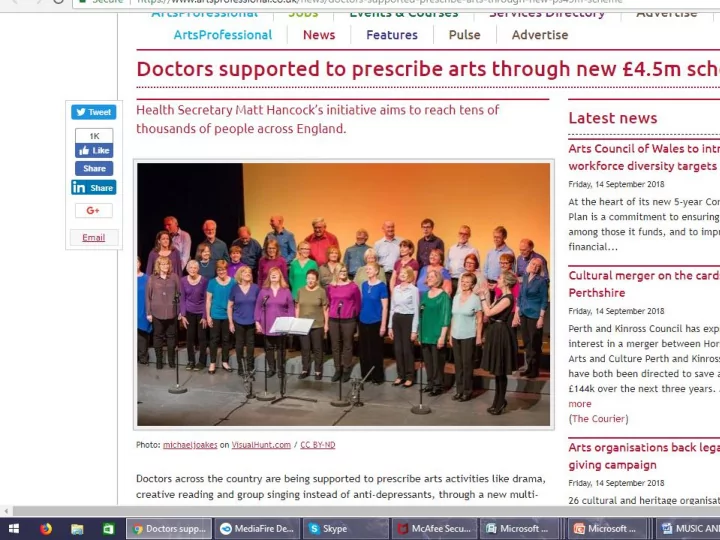

Severe mental health issues were on the rise, there were 6,000 suicides in the UK every year, and 10% of children had a diagnosed condition. Anti-depressant prescriptions doubled between 2006 and 2016 and detentions under the mental health act were also on the rise. "Arts and Minds" revealed those undertaking an arts-based interventions reported 71% decrease in feelings of anxiety 73% fall in depression 76% of participants said their wellbeing increased 69% felt more socially included.
• In 2018 the CBI President Paul Drechsler called on policymakers to prioritise teaching that encourages creativity and teamwork
Musical Activities Programme (MAP) For supporting children with dyslexia
Dyslexia & Music • Children with dyslexia can have difficulties with rhythm production tasks as well as with language skills (e.g. Thomson & Goswami, 2008) • Performance on rhythm production tasks is linked with performance on phonological, reading and spelling tasks (e.g. Flaugnacco et al., 2014) • A recent MAP study found that 15 weeks of classroom- based rhythm games with children with dyslexia significantly improved their phonological and literacy skills (Moore, Branigan & Overy, in prep )
• Evidence suggests that musical learning can promote structural and functional changes in the brain (e.g. Tervaniemi, 2009; Moore et al., 2014) • Evidence suggests that music and language are processed in similar, as well as distinct regions of the brain (e.g. Patel, 2010, Koelsch, 2012) • Evidence suggests that joint music-making can have a positive impact on social skills and feelings of well-being (e.g. Kirschner & Tomasello, 2010, MacDonald et al., 2012) • Evidence suggests that other conditions related to timing issues in the brain will see similar improvements from active music learning (Slater & Tate 2018) • A strong, highly specific relationship was found between knowledge of nursery rhymes and the development of phonological skills, which remained significant when differences in IQ and social background were controlled. (Maclean et al., 1987)
Overy 2013 • Participants in the singing condition showed superior overall performance on a collection of Hungarian language tests after the 15-min learning period, compared with participants in the speaking and rhythmic speaking conditions. • These results suggest that a “listen -and- sing” learning method can facilitate verbatim memory for spoken foreign language phrases.
• “ The frightening lack of music in our curriculum, indeed the definite anti-music tendency, is gravely detrimental to the education of the nation, too .” - Zoltan Kodály
• Headteachers sometimes unaware of benefits, but more often feel constrained by hurdles. • Patchy - at the whim of headteachers – academies can opt out, • Too easy to box-tick, no quality control, very low expectations • Skills shortage in the profession. • How do we differentiate between expensive, low-quality commercial packages, and high quality music education? • Cuts • “Ca***** ls ” • “Cold Spots” – unreachable schools. • 2-6 hours given to music on ITE courses.
How I was taught music Presenting everything at once. Pointing out all the mistakes Drilling – practise makes perfect “Woodshedding” alone Music for the few. Racing through exams. Writing about Music Stay Still!
“The purpose of music is not that it should be judged, but that it should become our substance”
Music is for Everyone • Musically “literate” – able to read, write, aurally dictate, compose and improvise. • Instilled with life-long musical literacy.
The Whole School Approach • Miminim 3 sessions per week for every class. • Daily Singing. • Musical Routines. • Using music in other lessons. • Whole staff development with a primary music specialist – everyone a musician. • Playground music leaders. • Training support staff for SEN
• Extra curricular clubs every lunchtime and after school. • Music Assembly with weekly visiting musicians. • 2 school choirs. • 2 music specialists
• Special measures to recommendation for Outstanding in 5 years. • Our results for disadvantaged pupils are well above average. • SATS results spectaluarly above the national average • Attendance improved from 92% to 98% • 98% speak English as a second language at home • We are now in the top 1% of schools for pupil progress. • Nominated for TES Primary School of the Year 2018.
Lets do this properly • A shift in thinking to value active music making as a “core” subject, essential for multiple deveopmental reasons. • Sustained training and high expectations. • CPD in methodology and musicianship for existing, non-specialist music co-ordinators. • Systemic change to schools framework to enable and empower schools to thrive musically – • Schools to be responsible and accountable for the quality of their music programmes and progress of children. • 2020 NPME
Let’s do this together
Recommend
More recommend